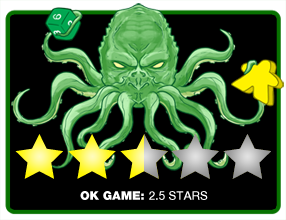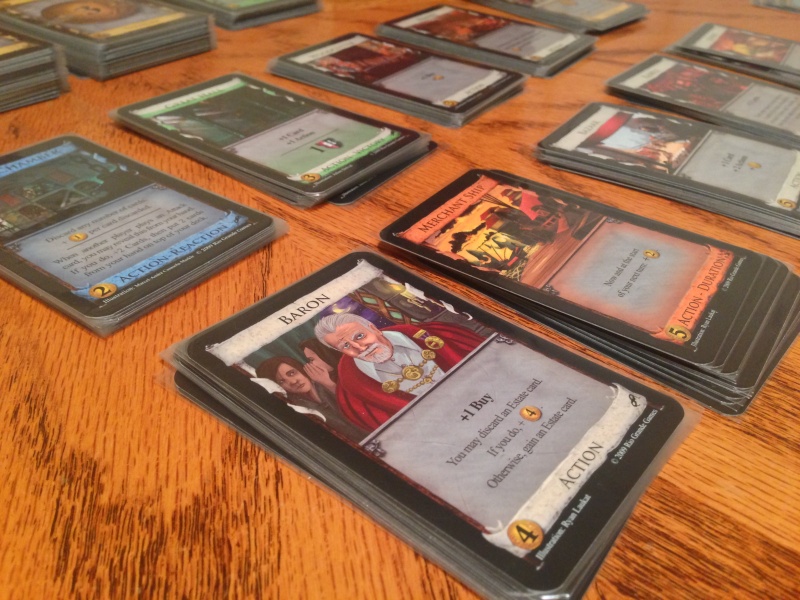 Once upon a time, there was a game called Western Legends. It’s a sandbox thing. You can go anywhere. You can do anything. It’s enormous and takes a while to play and the variety of actions is, frankly, overwhelming. Once upon a slightly later time, I acquired Western Legends—and all of its expansions—and thoroughly enjoyed it. Even later still, I got rid of everything I had for it. It was too much. I loved all of it, but had to basically relearn every tiny rule and edge case every time I sat down to play. If only the game weren’t so big!
Once upon a time, there was a game called Western Legends. It’s a sandbox thing. You can go anywhere. You can do anything. It’s enormous and takes a while to play and the variety of actions is, frankly, overwhelming. Once upon a slightly later time, I acquired Western Legends—and all of its expansions—and thoroughly enjoyed it. Even later still, I got rid of everything I had for it. It was too much. I loved all of it, but had to basically relearn every tiny rule and edge case every time I sat down to play. If only the game weren’t so big!
In a bizarre turn of events, there now exists—once upon a now time, if you will—a wallet-sized version of what is decidedly not a wallet-sized game. Western Legends Showdown is a tiny spinoff that borrows its artwork and theme from its big brother but almost nothing else.
This dueling card game is for two players only and takes about 20 minutes to play.
Gameplay Overview:
Western Legends Showdown is essentially the exact opposite of a sandbox game. In this game, players will play their vaguely poker-styled cards in one of three locations in the center of the play area. Each area has a condition by which it will be “won,” thereby letting the player who triggers this collect all of the cards currently stacked there. The game comes with seven location cards with different win conditions; of these, only three will be in play each game. The win conditions are varied, but mostly involve either a total card number or value threshold in regards to the cards played there. Once won, the location is cleared but stays in play.

Players have access to a hand of three cards at a time drawn from their nine-card deck. These cards are numbered 1 through 7 and each has a power associated with it. These are fairly basic (the 1, for instance, lets a player immediately play another 1), but the powers only trigger if the card played has a higher number than the previous card played or if the card is the only one present.
The game also has a tiebreaking mechanism in the form of the Reputation card. Basically, whoever has this card can give it to their opponent in order to skip their turn for better positioning. The catch, however, is that the holder of the Reputation card at the end of the game will have the tiebreaker advantage.
Those are basically all the rules of the game. Once players are out of cards, whoever has collected the most overall cards wins the game.

Game Experience:
Western Legends Showdown is an odd game. It plays comically fast (even faster than this review probably makes it sound) and the strategic depth involved never really goes beyond a very basic, surface level. Yes, there is the Reputation mechanism which can allow a player to alter the flow of the turn structure, but even that is just a stopgap measure and often doesn’t make a whole lot of sense, since playing a card is typically better than waiting to see what card one’s opponent will play.

There’s also not much variety in how every game will play out. There are only seven location cards and three are always in play. Even by intentionally not repeating them that means players will see all of them in 2.3(repeating) games. I understand this is a wallet game meant for portability, but given how uninteresting these cards are to begin with, that’s not a ton of replay value.
On top of that, and it might be unfair to compare this game to something like Air, Land, and Sea, but the powers on the cards in that game (which uses a similar “location” structure) are much more interesting than the ones here, especially since often (here) the powers won’t even trigger. And some powers seem strangely overpowered (like the 7 card, which essentially creates an autowin at a location if you draw it at the right time).
Final Thoughts:
Overall the game is fine for what it is, but I’m not sure (a) who exactly it’s for or (b) why it exists. Western Legends is an enormous, do-whatever-you-want game with amazing thematic ties, a billion components, and even more expansions. To take that universe and turn it into this type of game seems at odds with what both games are trying to do. If Showdown was an exceptional game of its type—which, sadly, it isn’t—the conversation would be different and the oddity of its affiliation with the bigger game wouldn’t matter. But as it stands, the game is just okay at best and significantly worse than similar games already in existence.
Final Score: 2.5 Stars. A mediocre game that’s a somewhat mind-boggling entry in the Western Legends shared universe.
 Hits:
Hits:
• Artwork, although derivative of the game on which it’s based, is great
• Easy and fast to play
Misses:
• No theme
• Low replay value






















